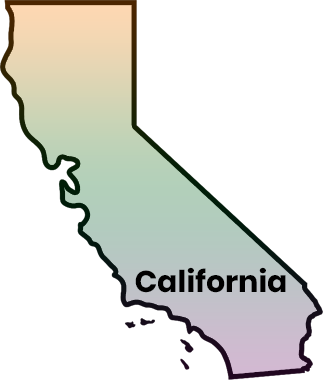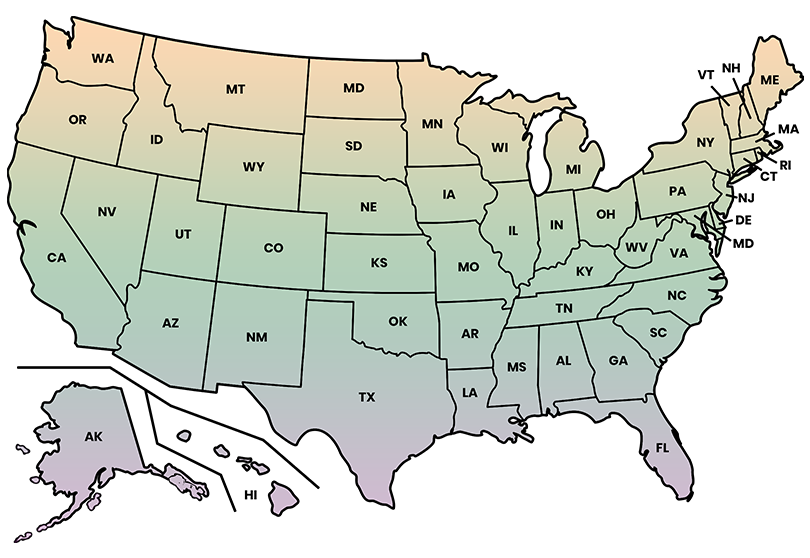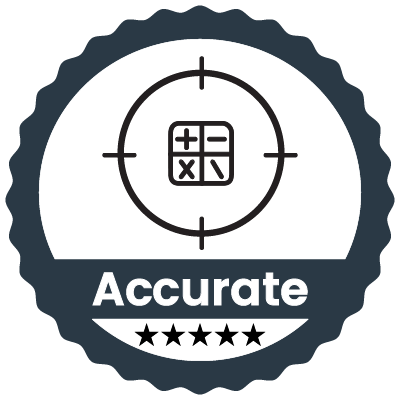Before distributing pay stubs to your employees and contractors in California, it's crucial to understand the pertinent laws and regulations.
This guide offers comprehensive insights into the requirements that employers in California must adhere to when managing payroll and issuing pay stubs.

Pay stub regulations in California
1. Are pay stubs required by law in California?
According to California labor law, employers must provide pay stubs to their employees when paying salaries. Employers that don’t issue pay stubs to employees may incur a penalty of $50 for the first pay period and $100 from the second pay period, up to a maximum of $4,000 per employee.
2. How often do you need a pay stub in California?
Employers must provide paycheck stubs to employees at least semimonthly. It is recommended that you provide check stubs every time you pay an employee.
3. What information must be on a pay stub in California?
California Labor Code Section 226(a) outlines the following information to be included on employee pay stubs:
- Legal name and address of the company
- Employee name
- Only the last four digits of the employee’s social security number or an employee identification number
- Total work hours, including overtime (not applicable to salaried exempt employees)
- Pay period with beginning and end dates
- Gross earnings
- Net earnings
- The number of piece-rate units earned and any applicable piece rate if the employee is paid on a piece-rate basis
- All deductions, provided that all deductions made on written orders of the employee may be aggregated and shown as one item
- All applicable hourly rates in effect during the pay period and the corresponding number of hours worked at each hourly rate by the employee
- Available sick leaves
Information needed to generate pay stubs
To provide employees with accurate pay stubs, the information below is required.
- Form DE4 (Employee’s Withholding Allowance Certificate) to calculate the tax amount to be withheld from employee wages. The form information includes regular allowances, total allowances, filing status, additional state withholding, and additional allowances.
- The employee’s SDI applicable status
- The employee’s exemption status from state withholding
- Supplemental type: If supplemental wages such as bonus or overtime are paid along with regular wages
Have all the information handy?
With SecurePayStubs, you can calculate accurate federal and California state taxes for your employees and generate pay stubs securely.
California wage and hour laws
Under the California wage and hour law, employers are required to provide minimum wage, overtime pay , meal and rest breaks, and paid time-off benefits to all non-exempt employees.
The law covers the following:
Minimum wage
The state of California has set a minimum wage for employees and employers are required to pay at least the minimum wage set.
Starting January 1, 2025, the minimum wage in California will be standardized at $16.50 per hour for all employers, regardless of the number of employees. This statewide rate applies unless a higher wage is required by specific industries or local ordinances.
| Effective Date | Employers with 25 or Fewer Employees | Employers with 26 or More Employees |
|---|---|---|
| January 1, 2025 | $16.50/hour | $16.50/hour |
Overtime pay
Non-exempt employees who work more than 8 hours in a workday or more than 40 hours in a workweek must be paid an overtime pay of 1.5 times their regular pay rate.
Non-exempt employees who work more than 12 hours in a workday or more than 8 hours on the seventh day of a workweek must be paid an overtime pay of 2 times (double time) their regular pay rate.
Meal breaks
- Non-exempt employees in California who work more than 5 hours in a workday should have at least 30 minutes for meal breaks.
- Non-exempt employees in California who work more than 10 hours in a workday should have a second 30-minute meal break.
Rest breaks
Non-exempt employees should be given 10-minute breaks for every 4 hours they worked.
Paid time off and leave
Starting January 1, 2024, California employees must receive at least 40 hours or five days of paid sick leave annually, whichever is greater. This continues into 2025 and beyond. For example, employees working 10-hour days are entitled to 50 hours, while those working 6-hour days receive 30 hours but retain 10 unused hours. Employers must update posters and notices annually and ensure their policies comply with state law, offering accrual or upfront allocation as required.
California's paid sick leave law covers all employees working at least 30 days for the same employer annually, including part-time, temporary, per diem, and IHSS providers with limited exceptions.
In California, employers are not required to offer vacation, but if they do, vacation is considered earned wages and must be paid out upon termination.
California State Payroll Taxes
California has four payroll taxes.
- California state unemployment insurance (SUI) tax
- Employment Training Tax (ETT)
- State Disability Insurance (SDI)
- California Personal Income Tax (PIT)
California state unemployment insurance (SUI) tax
The unemployment insurance tax is governed by the US Department of Labor under the Social Security Act. The UI tax amount collected will be given to unemployed people as temporary payments.
- California State Unemployment Tax Act(SUTA) wage base limit for 2025: $7,000
- California SUTA tax rates for 2025: 1.5 to 6.2%
- California SUTA tax rates for new employers: 3.4% (for 2 to 3 years)
- A 15% emergency surcharge on the base rate.
Employment Training Tax (ETT)
The employment training tax is collected from employers to train employees in order to make businesses in California more competitive.
- If the employer’s UI reserve account balance is positive (zero or greater), the employer pays an ETT rate of 0.1%.
- If the account balance is negative, the employer does not pay ETT, and the rate shows as 0.0%.
- No Protest: Employers cannot protest the ETT rate.
- The Employment Training Tax(ETT) rate for 2025: 0.1%
- The ETT taxable wage limit for 2025: $7,000 per employee, per calendar year (the maximum amount of an employee's earnings subject to the Employment Training Tax)
State Disability Insurance (SDI)
The State Disability Insurance(SDI) program offers temporary payments to employees for non-work-related illness, injury, and pregnancy.
The SDI withholding rate, which is the same for all employees, is calculated annually based on the SDI Fund balance, disbursements, and wages paid, and employers cannot protest the rate.
- The SDI withholding rate for 2024: 1.1%.
- The SDI withholding rate for 2025: 1.2%.
- Wages Subject to SDI: Starting from January 1, 2024, all wages are subject to SDI contributions.
California Personal Income Tax (PIT)
This tax is levied on California employees’ income to provide resources for public services such as schools, parks, roads, and health & human services.
California has nine tax brackets (1%, 2%, 4%, 6%, 8%, 9.3%, 10.3%, 11.3%, 12.3%, and 13.3%). The tax brackets will vary depending on the employee’s income and filing status (Single, Married Filing Jointly, Married Filing Separately, and Head of Household statuses).
Calculating personal income taxes can become more complex as the income and filing status will be different for each employee.
You can use SecurePayStubs to generate pay stubs for employees with accurate California taxes including personal income taxes.
Tax payment schedule
Employers in California must make payroll tax deposits to the Employment Development
Department (EDD):
- SUI and ETT tax amounts should be deposited every quarter
- PIT and SDI tax amounts should be deposited based on the federal tax deposit schedule.
There will be a penalty of 15% + interest for businesses that pay tax deposits late.
If your business has next-day federal deposit requirements, refer to the table below:
| Accumulated State PIT Withholding | PIT and SDI Deposit Due By | California Deposit Schedule |
|---|---|---|
| Less than $350 | April 30, 2025 July 31, 2025 October 31, 2025 February 2, 2026 | Quarterly |
| $350 to $500 | 15th of the following month | Monthly |
| More than $500 | Next business day | Next-Day |
If your business has semi-weekly federal deposit requirements, refer to the table below:
| Accumulated State PIT Withholding | Payday | PIT and SDI Deposit Due By | California Deposit Schedule |
|---|---|---|---|
| Less than $350 | Any day | April 30, 2025 July 31, 2025 October 31, 2025 February 2, 2026 | Quarterly |
| $350 to $500 | Any day | 15th of the following month | Monthly |
| More than $500 | Wed, Thurs, or Fri | Following Wednesday | Semi-weekly |
| More than $500 | Sat, Sun, Mon, or Tues | Following Friday | Semi-weekly |
If your business has monthly, quarterly, or annual federal deposit requirements, refer to the table below:
| Accumulated State PIT Withholding | PIT and SDI Deposit Due By | California Deposit Schedule |
|---|---|---|
| Less than $350 | April 30, 2025 July 31, 2025 October 31, 2025 February 2, 2026 | Quarterly |
| $350 or more | 15th of the following month | Monthly |
California payroll tax filing
Businesses in California must file four forms.
- Report of New Employees (Form DE 34)
- Report of Independent Contractors (Form DE 542)
- Quarterly Contribution Return and Report of Wages (Form DE 9)
- Quarterly Contribution Return and Report of Wages (Continuation) (Form DE 9C)
Report of New Employees (Form DE 34)
Employers must report new or rehired employees to the New Employee Registry within 20 days of their first day of employment. You will need to file Form DE 34 form with the employment tax office for newly hired employees.
Penalties for Non-Compliance
A penalty of $24 may be imposed for each late report, unless the delay is justified by a valid reason.
How to report employee new hires in California?
You can use any of the following options to report new hiring.
| Online | Fax | |
|---|---|---|
| e-Services for Business | Employment Development Department PO Box 997016, MIC 96 West Sacramento, CA 95799-7016 | 1-916-319-4400 |
Report of Independent Contractors (Form DE 542)
Employers must report new or rehired independent contractors to the New Employee Registry within 20 days of either making payments totaling $600 or more or entering into a contract for $600 or more. You will need to file Form DE 542 form with the employment tax office for newly hired independent contractors.
How to report contractor new hires in California?
You can use any of the following options to report new hiring.
| Online | Fax | |
|---|---|---|
| e-Services for Business | Employment Development Department PO Box 997350, MIC 96 Sacramento, CA 95899-7350 | 1-916-319-4410 |
Do you know?
You can generate pay stubs for independent contractors working for you using SecurePayStubs.
Quarterly Contribution Return and Report of Wages (Form DE 9)
Form DE 9 needs to be filed with the Employment Development Department (EDD) for every quarter. This form is filed to reconcile the wages reported and taxes paid in the quarter.
Quarterly Contribution Return and Report of Wages (Continuation) (Form DE 9C)
Form DE 9C needs to be filed with the Employment Development Department (EDD) for every quarter. This form is filed to report wages paid to each employee in the quarter.
Both Forms DE 9 and DE 9C need to be filed every quarter. These forms can be filed electronically or by paper.
If you are filing the forms above by paper, you can send them to:
Due date to file Form DE 9 and Form DE 9C
Below are the deadlines for filing California payroll forms.
| Quarter | Deadline |
|---|---|
| 1st Quarter of 2025 (January, February, March) | April 1 Delinquent if not filed by April 30, 2025 |
| Quarter 2 2nd Quarter of 2025 (April, May, June) | July 1 Delinquent if not filed by July 31, 2025 |
| 3rd Quarter of 2025 (July, August, September) | October 1 Delinquent if not filed by October 31, 2025 |
| 4th Quarter of 2025 (October, November, December) | January 1, 2026 Delinquent if not filed by February 2, 2026 |
Processing payroll manually is complex
As a business owner who runs payroll manually, you will need to ensure all the items mentioned above are taken care of. You already have a lot on your plate and you might not want to get into the complex process of pay stub generation.
Utilizing SecurePayStubs' efficient paystub generator, you can swiftly produce accurate pay stubs for both your employees and independent contractors in less than 2 minutes. Simply input essential details for both employee and employer, choose a free pay stub template, and allow SecurePayStubs, your California pay stub tax calculator, to precisely compute applicable payroll taxes.
This article has been updated from its original publication date of March 12, 2025
Frequently asked questions
Is it legal for an employee to ask for pay stub in California?
What information must be included on a paycheck stub in California?
California Labor Code Section 226(a) outlines the following information to be included on employee pay stubs:
- Employee name
- Legal name and address of the company
- Only the last four digits of the employee’s social security number or an employee identification number
- Total work hours, including overtime (not applicable to salaried exempt employees)
- Pay period with beginning and end dates
- The number of piece-rate units earned and any applicable piece rate if the employee is paid on a piece-rate basis
- All deductions, provided that all deductions made on written orders of the employee may be aggregated and shown as one item
- All applicable hourly rates in effect during the pay period and the corresponding number of hours worked at each hourly rate by the employee
- Available sick leaves
What is California pay stub law?
Under California employment law, an employer is required to provide pay stubs to their employees when paying their wages. If an employer leaves out certain information or includes incorrect information, they may be in violation of California labor laws and subject to a statutory penalty.
Employers who don’t issue pay stubs to employees may incur a penalty of $50 for the first pay period and $100 from the second pay period, up to a maximum of $4,000 per employee.




